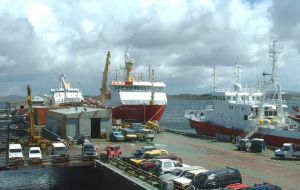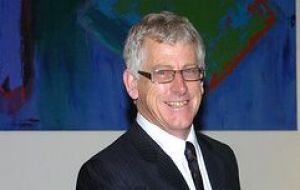MercoPress. South Atlantic News Agency
Falkland Islands’ assessing options for the expansion of port facilities
 FIPASS, Floating Interim Port and Storage System for now according to the local industry is coping
FIPASS, Floating Interim Port and Storage System for now according to the local industry is coping Falkland Islands port facilities are under assessment given the prospects of oil industry activities in the near future and two options are being considered by the local government: a new port project, and an interim development of the current facilities at FIPASS.
“Some immediate action is required in terms of survey work, design options and priorities to keep FIPASS operational” said Member of the Legislative Assembly Dick Sawle following the July Executive Council meeting.
The weights the oil industry are talking about in the near future are more than FIPASS can currently cope with and a solid structure is needed to the west of the barges, MLA Sawle told the Falklands’ weekly Penguin News.
A paper compiled by the directors of Natural Resources, Central Services and Projects noted that work to identify provisional costs for the preferred new port location, had begun and would continue over the next 12 plus months, including the assessment of the detailed environmental studies and conducting of marine and land based geotechnical surveys.
But it was anticipated that any new port project would not be ready to operate until at least January 2018.
The Falklands’ industry feedback was that at present FIPASS was coping; but that with any escalation of containerisation or oil and gas traffic, this situation could well change.
The Falklands’ Executive Council were asked to approve the interim development of FIPASS; the detailed design and costing for remedial and developmental work to FIPASS as identified in the paper, and the implementation of the remainder of the FIPASS Action Plan 2012-18 also as set out in the paper.
The government had recently been approached by two organisations, about the future provision and management of port services to the Falklands and there were a number of options available to Government, it was noted in the paper.
The interest from the local private sector in future port development was welcomed, but was as yet untested and consideration of options was needed to provide clarity to Government it was stated in the report.
The FIPASS management team had identified a number of current operational concerns regarding FIPASS today which require review including point loading limits, safe load limits for all sections and management and security of the entire dock.
Anticipated future throughput at FIPASS has been projected working on an average turnaround time of 1.5 days per vessel.
The current FIPASS management team, oil operators and FIFCA (Falkland Islands Fishing Company Association) feel that this turnaround figure is realistic.
Oil exploration company Rockhopper PLC has indicated, subject to its operations developing along current timescales, a 15% rise year on year in vessels needing to use FIPASS through to 2014.
From 2014 onwards they have further indicated more than 400 port visits/vessels annually with a further 15% rise year on year. It was also noted that oil and gas projections are currently based on a single field, Sealion, and should other fields develop it was highly likely that oil and gas traffic would increase further. A five per cent annual increase in other vessels (fishing/tourism etc) had been estimated, using previous years averages.
With the current three berths in operation and an average turnaround of 1.5 days, FIPASS could potentially fail to meet requirements in terms of berthing space by 2014 it was noted, adding that extending FIPASS to enable a five berth scenario for example, would delay this potential fail point until 2017.
Potential losses incurred through vessels having to wait to come alongside for a berth had also been assessed, and although indicative only, a figure of 30,000 US dollars per day had been utilised as a realistic cost.
Director of Mineral Resources John Barton estimated that in the worst case situation of a drilling operation having to cease due to the unavailability of berth space for re-supply the cost of rig downtime was in the region of 1 million dollars per day.
The paper noted that, in order to support oil and gas development over the next few years before a new port is delivered, there was a need to develop FIPASS and failure to do so could have significant financial consequences for the industry and for the Falkland Islands Government.
Regardless of oil and gas development however, the study equally showed a requirement to improve FIPASS due to its on-going wear and tear and improvement required to support the development of containerisation.
Should oil and gas not develop as anticipated, it was unlikely a new port facility would be affordable and in this scenario a permanent port at the FIPASS location was the likely outcome with any investment now to increase its working capability not wasted, the authors had noted.
The announcement last month that Rockhopper PLC had entered into a conditional farm-out agreement with Premier Oil created an additional urgency to undertake the work on design and costing of remedial and developmental work for FIPASS.
“The need to ensure the design detail and costing for the remedial development were completed by the end of September 2012, required the work to be commissioned swiftly”, said MLA Sawle.
The paper noted that Morrison (Falklands) Ltd was the Government’s preferred contractor in this area and as such had been approached and indicated they could complete the work to this timeframe. Penguin News





Top Comments
Disclaimer & comment rules-

-

-

Read all commentsdon't forget a terminal for all those cruise liners!!!!!!
Aug 04th, 2012 - 07:36 pm 0Lots of good storys about devopment in the falkland lands :) good on them. Wonder what Mr timerman well say “ the evil english pirates are going to build a new military port that threatens all of south america jajajajajajaja” lol.
Aug 04th, 2012 - 07:56 pm 02
Aug 04th, 2012 - 09:12 pm 0lol
Commenting for this story is now closed.
If you have a Facebook account, become a fan and comment on our Facebook Page!